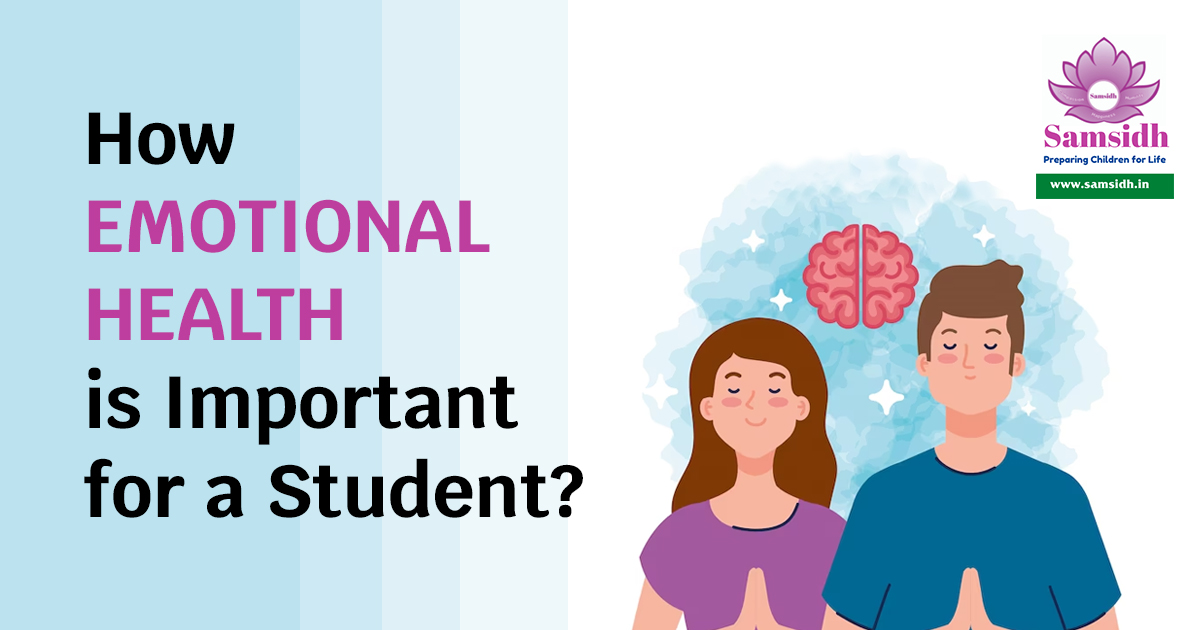
An important component of a student’s well-being is their emotional health, which has a big impact on their relationships, academic achievement, and general quality of life. Stress, anxiety, despair, and other emotional difficulties that call for care may arise when students balance the demands of their academic and personal lives.
A person’s capacity to comprehend and effectively control their emotions is referred to as emotional wellness. It entails being conscious of one’s emotions, recognizing emotional triggers, and creating constructive coping methods.
Emotional health is crucial for a student’s overall well-being and future success. Parents and educators must provide a supportive and nurturing environment to promote emotional health. Investing in emotional health not only benefits the individual but contributes to the growth and development of the nation. As Pandit Nehru said, “The children of today will make the India of tomorrow. The way we bring them up will determine the future of the country.”
Here are some reasons why emotional health is essential for students:
Confidence and Self-Esteem
Emotional health plays a crucial role in building self-esteem and confidence. When students are emotionally healthy, they tend to have a positive self-image and are more likely to be self-assured. Conversely, when students experience emotional distress, it can negatively impact their self-esteem, making it difficult for them to feel confident in themselves and their abilities.
Educational Success
The emotional well-being of a student can have a big impact on their academic success. Students are better able to focus, learn, and retain information when they have a good emotional balance. On the other hand, when students are distressed emotionally, it might be difficult for them to concentrate, engage in class, and finish their work. With stronger stress and anxiety management skills, students can achieve higher academic results.
Relationship Development
Building healthy relationships with classmates, family, and friends also depends on emotional well-being. Students that are emotionally stable tend to interact with others more positively and can build greater relationships. Strong connections foster a sense of community and social support, which can boost resilience and general well-being.
Mental Wellness
Emotional well-being is essential for preserving excellent mental well-being. Mental health issues including depression and anxiety are more likely to develop in students who are experiencing emotional strain. A sense of well-being and a reduced risk of mental health problems can both be enhanced by good emotional health.
Resilience
Resilience is the capacity to overcome obstacles and failures. Being emotionally healthy is essential for building resilience because it enables pupils to cope with stress, overcome challenges, and keep a good attitude. Students must possess resilience in order to excel academically and in life.
Enhancement of Physical Health
Emotional and physical well-being are closely related. Students who are emotionally distressed may also experience physical symptoms like headaches, lethargy, and digestive issues. Contrarily, excellent emotional health can enhance physical health by lowering stress, encouraging positive lifestyle choices like regular exercise and a balanced diet, and enhancing the immune system.
Improved decision-making abilities
Emotional health is also essential for developing better decision-making skills. When students are emotionally healthy, they are better equipped to assess situations objectively, consider different options, and make informed decisions. In contrast, when students are emotionally distressed, it can lead to impulsive decision-making and poor judgment
Enhancing Time Management
Effective time management can also benefit students who are in good emotional health. Students who are emotionally stable are better able to organize their workload, set achievable goals, and refrain from procrastinating. Students who are emotionally well can also improve their time management abilities, which are crucial for academic achievement.
More Innovation and Creativity
Emotional health is also linked to creativity and innovation. When students are emotionally healthy, they are more likely to think outside the box and come up with creative solutions to problems. Emotional health can also improve students’ ability to collaborate with others and work effectively in teams.
Enhanced Career Opportunities
Finally, a student’s professional prospects can be enhanced by strong emotional health. Companies place a high value on emotional intelligence, which is the capacity to comprehend and effectively control one’s emotions. Pupils who have strong emotional health are better able to handle interpersonal conflicts, communicate well, and adjust to shifting work circumstances.
Conclusion:
In conclusion, emotional health is crucial for a student’s success, and it has far-reaching benefits, from enhancing academic achievements to fostering better relationships and mental wellness. Parents, educators, and policymakers should make emotional health a priority by providing supportive and nurturing environments that promote the development of healthy coping mechanisms and resilience. By doing so, we can ensure that students are equipped to tackle the challenges of the future and contribute to the growth and development of our society.
FAQs:
1.Why is emotional health important for students?
Emotional health plays a crucial role in a student’s academic performance, social interactions, and overall well-being. A mentally healthy student is more focused, motivated, and resilient.
2.How does emotional well-being affect academic performance?
A student with good emotional health can handle stress effectively, maintain concentration, and perform better in exams and daily learning activities.
3.What are the signs of poor emotional health in students?
Common signs include lack of focus, mood swings, social withdrawal, anxiety, excessive stress, and declining academic performance.
4.How can parents and teachers support a student’s emotional well-being?
Encouraging open communication, fostering a supportive learning environment, and teaching stress management techniques can help students maintain good emotional health.
5.What activities can improve a student’s emotional health?
Activities such as meditation, journaling, physical exercise, engaging hobbies, and regular social interactions contribute to better emotional well-being.
